Common Grounds
As world roils, Ethiopian-born minister leads ‘wake up’ call on racism in Israel
Source: The Times of Israel
By SAM SOKOL
Published 11 June 2020
Many black Israelis say they see a reflection of their own struggle in Floyd protests. Absorption Minister Pnina Tamano-Shata says Israel must, and can, become a beacon of progress

People hold a rally in memory of George Floyd and against racism, at Rabin square in Tel Aviv, on June 7, 2020. (Tomer Neuberg/Flash90)
The killing of African-American George Floyd while in police custody on May 25, and the massive anti-racism protests that event unleashed — both in the US and around the world — has struck a chord with Israel’s Ethiopian community as well. And the country’s first Ethiopian-born minister has told The Times of Israel that police and the government must “wake up now” to institutional racism in law enforcement.
More than 144,000 Jews of Ethiopian descent live in Israel, and community activists have long complained of institutional racism and violence at the hands of law enforcement.
As demonstrations spread across world capitals over systemic racism toward blacks, Israel too has seen rallies in Jerusalem and Tel Aviv.
“We need the whole system to wake up,” said newly appointed Immigrant Absorption Minister Pnina Tamano-Shata. “And we won’t accept the disproportionate data that you see, showing that there’s more Ethiopians in jail and more and more police files being opened against young Ethiopians.”
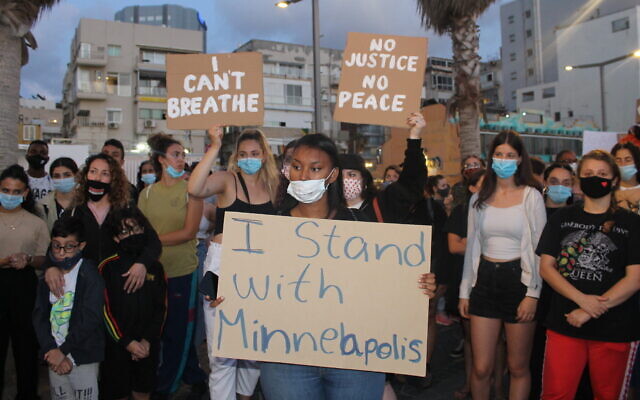
Israelis protest against the murder of George Floyd outside the US Embassy annex in Tel Aviv on June 2, 2020. (Sam Sokol)
Deputy Public Security Minister Desta “Gadi” Yevarkan, himself an Ethiopian Jew, took to Facebook to condemn the killing of 46-year-old Floyd, calling it “one of the most racist, cruel and deadly events ever recorded” and noting that “police violence against blacks has touched many countries in the world.”
Although the Israeli police are tasked with making sure that people feel secure and protected, Yeverkan wrote, often “white Israeli citizens feel safe when they see a police car in their neighborhood, while black Israeli citizens feel unsafe.”
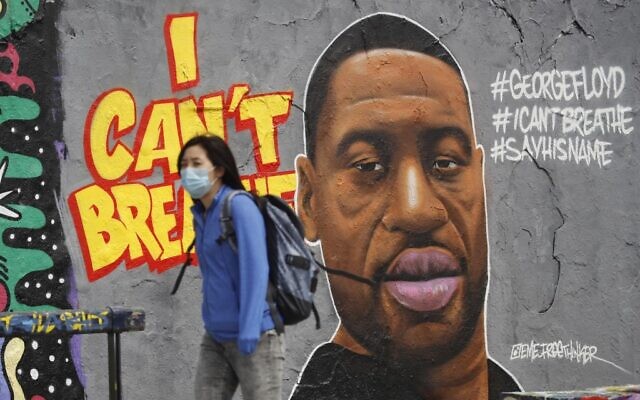
A woman wearing a protective mask walks past graffiti in Berlin’s Mauer Park depicting George Floyd, a black man who died in Minneapolis after a white policeman kneeled on his neck for several minutes. (Photo by Odd ANDERSEN / AFP)
A history of friction
Last year, widespread protests rocked Israel when tens of thousands of Ethiopian Jews took to the streets following the shooting death of 19-year old Solomon Tekah at the hands of an off-duty police officer. Protesters blocked roads, burned tires and, in one incident, burned a car at Tel Aviv’s busy Azrieli Junction.
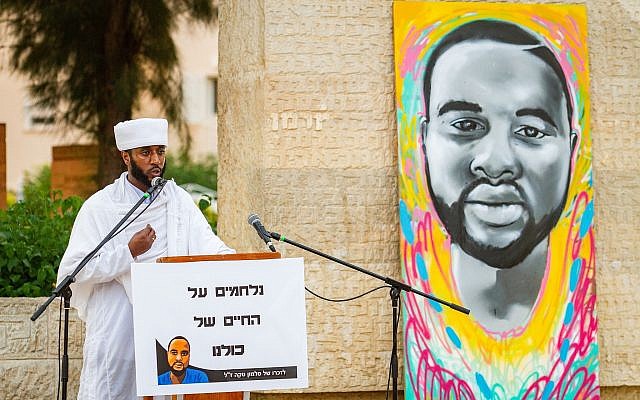
Family members and supporters attend a ceremony in memory of 19-year-old Ethiopian-Israeli, Solomon Tekah who was shot and killed by an off-duty police officer on in Kiryat Haim, July 10, 2019. Photo by Flash90
Tekah’s death came six months after Yehuda Biadga, 24, a mentally ill Ethiopian Israeli, was shot and killed by police who say he charged an officer while brandishing a knife. His death led to demonstrations throughout Tel Aviv.
May 2015 saw similar protests erupt following the beating of Ethiopian-Israeli soldier Damas Pakada. Those protests devolved into riots in which police officers fired stun grenades, water cannons and tear gas to disperse the demonstrators, who threw rocks and glass bottles at policemen and also vandalized some storefronts.
Watch the wideo HERE
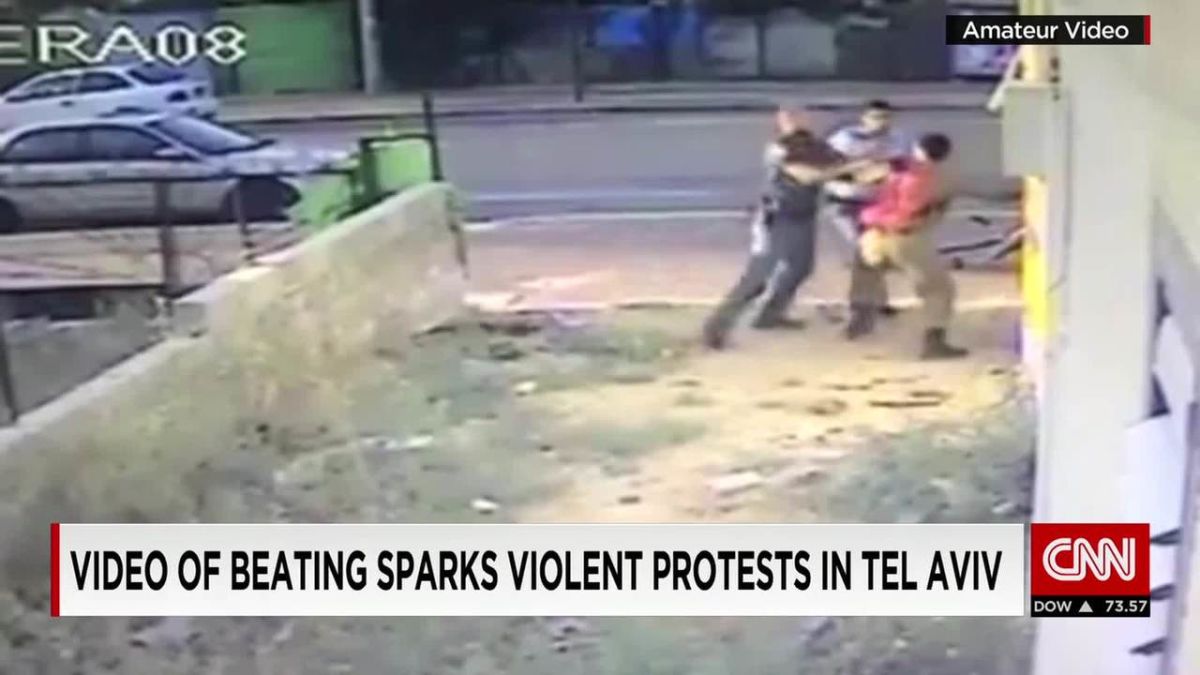
“It’s not really a strange topic for Ethiopian youth to be talking about. Especially with what’s been happening with George Floyd, we speak about it quite frequently and it’s quite saddening,” said Adise Ijigu, an 18-year-old student from Kiryat Yam. “People with darker skin are afraid of approaching the police and afraid that they might be racially profiled or even killed.”
Rivka Demoza, a resident of Haifa, said: “It’s hard for me to see the footage from the United States. It’s hard because I think ‘What if I was there? What if I was visiting?’ I think as a tourist I wouldn’t want to go there. All my friends are sharing posts and talking about the cases from Israel and the US.
“I was in tears watching that man beg for his life and it’s like [the policemen in the video] don’t have any emotions. They’re going about like robots, and what makes me angrier is that in Israel the justice system is not working in favor of the citizens that were shot,” she continued, noting that while the officer who shot Tekah was charged with negligent homicide, many others have not gone to trial.
Demoza recalled how her younger brother left home one evening to hang out with friends and was confronted by two police officers while waiting for a cab outside their home. The officers refused to believe that he lived there, even after seeing his ID card, she said, adding that if her uncle had not been a police officer himself, her brother could have been in real trouble.
And unless this kind of behavior changes, she predicted, Israel was likely to see further protests.
“The violence [in the US] is also traumatic for us,” said Shula Mola, former chairperson of the Association for Ethiopian Jews.
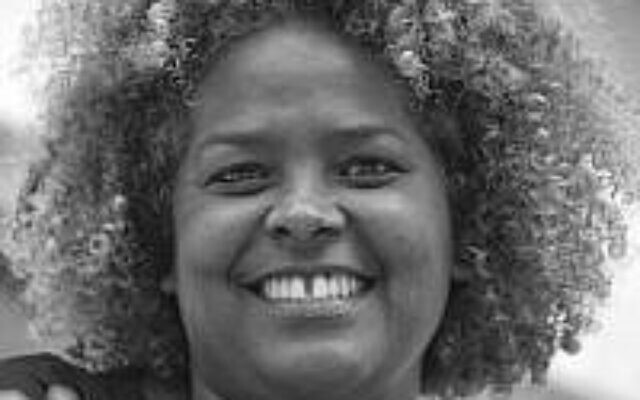
Shula Mola. (Courtesy)
“It feels like it’s against us. It’s a sad story. We tried for years to be like everyone and enter into society and it was everyone’s dream. It’s hard when things like this happen because of color… The situation isn’t so different [in the two countries]. Violence is violence and racism is racism and when a white person has power to kill someone black it’s the same, it doesn’t make a difference here or there.”
Persistent inequalities
Statistics show significant inequalities between Ethiopian-Israelis and the rest of the population.
Ethiopian soldiers are sent to military prison at a disproportionately higher rate than other groups and are arrested in civilian life at a higher rate than the general population. In 2017, approximately four percent of Israel Defense Forces soldiers came from the Ethiopian community, yet they accounted for 15.07% of female and 10.78% of male prisoners, according to the Association of Ethiopian Jews.
According to a recent report by the government’s Anti-Racism Coordinating Unit, the number of complaints of racial discrimination it receives doubled in 2019, with 37% of such charges coming from the Ethiopian community. The report also noted that while Ethiopian Jews comprise 1.7% of the population, their arrest rate stands at 3.27%. The unit was set up on the recommendation of a commission established by Prime Minister Benjamin Netanyahu in the wake of the 2015 protests.
In February, several police officers were removed from their posts in the southern city of Kiryat Malachi after it emerged that they had mocked and disparaged people of Ethiopian origin in a WhatsApp group, including one young man who had been brought to the police station, bloodied and in handcuffs.
Aside from incidents of police violence, a number of high-profile discrimination cases have also brought the issue of anti-Ethiopian racism into the public eye in recent years.
In 2017, restrictions on Ethiopians donating blood in Israel were lifted after a ban of several decades. The issue first came to the attention of most of the Israeli public in 1996, after it was revealed that Magen David Adom had been secretly disposing blood donated by Ethiopian Jews over fears they carried HIV/AIDS.
In June 2018, a leading Israeli winery was forced to apologize after it banned Ethiopian-Israeli employees from coming in contact with its wine due to an ostensible doubt about their Jewishness.
Some members of the ultra-Orthodox community do not recognize Ethiopian-Israelis as Jewish. Earlier this year the country’s Chief Rabbinate Council decided to reinforce its recognition of members of the community after an earlier decision on the matter failed to stop some officials from continuing to question their heritage.
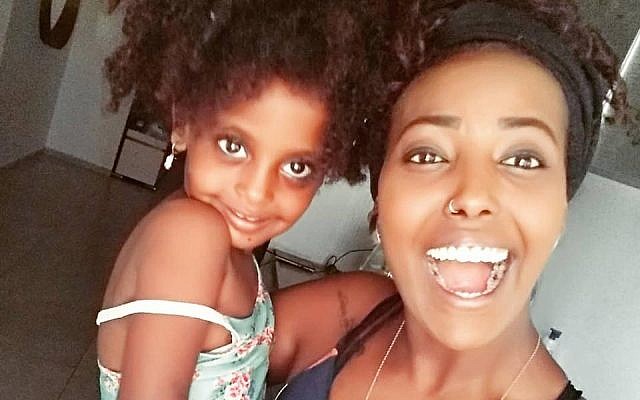
Sefy Bililin and her 3-year old daughter Pri’el. (Facebook)
Last September, a kindergarten in the southern town of Kiryat Gat was closed down after allegedly racially segregating its students, relegating children of Ethiopian descent to a secondary room with a separate entrance. In a Facebook post that went viral, local resident Sefy Bililin wrote that she brought her 3-year-old daughter Pri-el for her first day of kindergarten and was shocked to find herself directed to a classroom that was filled exclusively with Ethiopian Israeli youngsters.
In response, the Education Ministry announced that it had implemented new directives intended to prevent racial discrimination in educational institutions.
Trailblazing minister urges ‘integration, integration, integration’
“As a human being and a black woman, I can tell you that a lot of black people around the world and also in Israel can [identify] with what’s happening” in the US as relating to their own experiences, Immigrant Absorption Minister Tamano-Shata, the first Ethiopian-Israeli to be appointed to Israel’s cabinet, told The Times of Israel during a telephone interview on Tuesday.
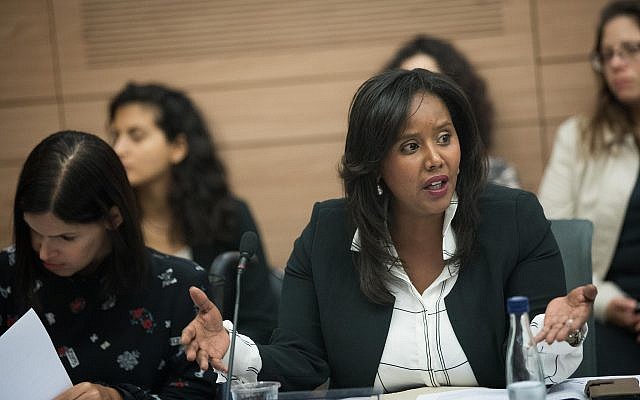
Immigrant Absorption Minister Pnina Tamano-Shata speaks at a Knesset committee debate, May 21, 2019. (Yonatan Sindel/Flash90)
She said Acting Police Chief Motti Cohen and Public Security Minister Amir Ohana needed “to wake up — now, not tomorrow.” She added that she’d told Ohana he needed to remove problematic officers from the force.
“Someone who is racist cannot be in the police. Someone who is a criminal cannot be in the police,” she stated.
Tamano-Shata said she planned to ensure the matter stays on the agenda of relevant cabinet ministers, in order to implement initiatives to reform policing in Israel. She added that even though her concerns had been welcomed, she knows that to make progress, she’ll need to continue pushing.
“I’m very stubborn and I won’t just let people tell me ‘happily’ and not follow up,” Tamano-Shata said.
Calling for accountability in policing, the minister recommended that police be required, on a city by city basis, to keep records of arrests and charges against young Ethiopian-Israelis and to report that data to community leaders every three months. Moreover, police commanders should maintain an “open door” in order to listen to community concerns, she said. Such a move would allow for the identification of officers involved in a pattern of racist behavior.
Things in Israel have improved since 2015 but “unfortunately it’s not enough,” she said.
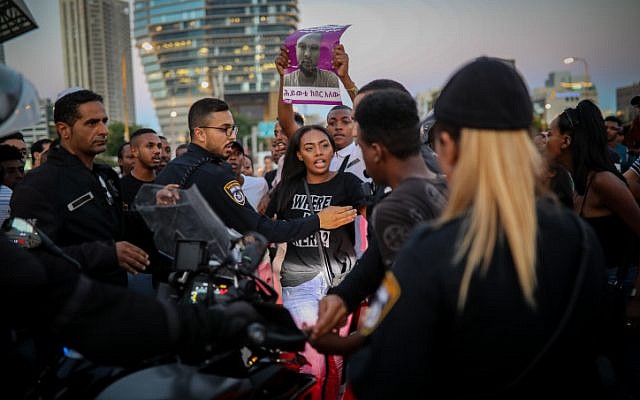
Ethiopian-Israelis and supporters protest following the death of 19-year-old Ethiopian, Solomon Tekah who was shot and killed June 30 in Haifa by an off-duty police officer, in Tel Aviv, July 2, 2019. (Hadas Parush/Flash90)
Aside from dealing with racism, it is also important to help provide Ethiopian-Israelis with more opportunities to succeed, she added. Many Ethiopians have been subject to what amounts to de facto segregation and the answer, said Tamano-Shata, is “integration, integration, integration.”
Calling for “affirmative action” and an end to separate classes and programs for Ethiopian students, she said that when people are separated out, “they start to believe that they are different and lesser than others.”
But while the fight against racism will be a “long struggle” that will only be won with state intervention, many in the Netanyahu administration are sympathetic, she said. “The situation in the US is much worse and the history is different. In Israel there is a possibility that the political system can fix racism faster, smarter and more efficiently than in America. We just need the will and leadership.
“I believe in Israel we can make big changes and be an example for the rest of the world.”
A problem for all Israelis
Other prominent Ethiopian-Israelis were less optimistic.
Dr. Tsega Melaku, a journalist who formerly headed the now-defunct Israel Broadcasting Authority’s Reshet Aleph and sat on a 2016 governmental panel to fight racism against the community, told The Times of Israel that “in order for things to change we need to understand it’s a problem of the whole country and society. It’s not just our problem.”
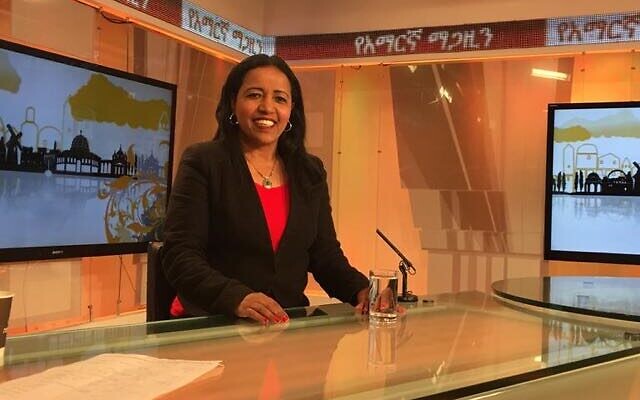
Dr. Tsega Melaku. (Courtesy)
She pointed to what she described as excessively negative media coverage of Ethiopian-Israeli protests as a sign of bias that helps entrench racist narratives.
She said the presence of white demonstrators at recent US protests shows that that issue is finally seen by many there as one that affects all of society.
“When we went to the streets, white Israelis worried about the streets closing, not about our children getting harmed. And now this week several high profile Israelis came out and wrote against what happened in America. You also have black people here and we didn’t hear from you at our protests,” she added.
Community activist Avi Yalo also said he was disappointed in the lack of white people at Israeli protests. The fact that the George Floyd protests featured Americans of all ethnicities showed Israel in a bad light, he stated.
White Israelis “act like they did us a favor bringing us here,” he said. “They said ‘How aren’t you ashamed taking over the streets.’”
“There is much racism in the United States but there are more and more black people in media and politics and they have economic power, they have real power, [but] here where are they? There they care about police violence, here they worry about protester violence. It’s a racist state par excellence.”
Watch the wideo HERE

But Ethiopian-Israeli rapper and activist Teddy Neguse, whose 2017 song “Handcuffed” addresses police brutality against young Israeli men of Ethiopian descent, disagreed.
The younger generation in Israel knows that “racism is a stupid thing and they’ve started to realize that because they grew up with Ethiopians.” But, he added, “the older generation in Israel I think will be racist for the rest of their lives.
“There are a lot of things that Israeli society is trying to take from America, racism shouldn’t be one of them.”
Times of Israel staff and JTA contributed to this report.
LATEST OPEN LETTERS
-
03-02TO WORLD LEADERS
-
06-01Standing in Solidarity with the People of Venezuela
-
21-07Freedom
-
20-03Stand up to Trump
-
18-02Average Americans Response
-
23-12Tens of thousands of dead children.......this must stop
-
05-06A Call to Action: Uniting for a Lasting Peace in the Holy Land
-
28-05Concerned world citizen
-
13-02World Peace
-
05-12My scream to the world
VIRTUAL POST OFFICE
PETITIONS
LINKS
DONATION
Latest Blog Articles
-
12-02Our Friday News Analysis | What the World Reads Now!
-
11-02Our Wednesday News Analysis | From the Age of Catastrophe to the Age of Hope: Why a Free Palestine Matters to the World
-
10-02From the Age of Catastrophe to the Age of Hope: Why a Free Palestine Matters to the World
-
10-02Like a Gambler Who Lost His Fortune, Israel Wants Another War
-
10-02The next stage of the Gaza genocide has begun
-
09-02The Evangelical Pope | God is Present Among You
-
05-02Our Friday News Analysis | What the World Reads Now!
-
04-02Our Wednesday News Analysis | Trump’s Board of Peace and the politics of control
-
03-02Trump’s Board of Peace and the politics of control
-
03-02Weaponizing America’s Economy in Service of Israel
-
03-02The Final Expulsion of Palestinians Is Underway – and Your Indifference Enables It
Latest Comments
 One of the most important and illuminating articles that I …
One of the most important and illuminating articles that I …
Comment by Benjamin Inbaraj And what's wrong here?
After all, there is the homeland …
And what's wrong here?
After all, there is the homeland …
Comment by Isac Boian Does this reinforce or deny my argument that Israel is …
Does this reinforce or deny my argument that Israel is …
Comment by Edward Campbell Many 'say' they support the Palestinian cause but do little …
Many 'say' they support the Palestinian cause but do little …
Comment by Philip McFedries The UN is strangled by the "war for profit" cabal …
The UN is strangled by the "war for profit" cabal …
Comment by Philip McFedries I can't read the printing on the map.
I can't read the printing on the map.
Comment by Philip McFedries Good news!
Good news!
Comment by Philip McFedries

COMMENTS
This article has 0 comments at this time. We invoke you to participate the discussion and leave your comment below. Share your opinion and let the world know.